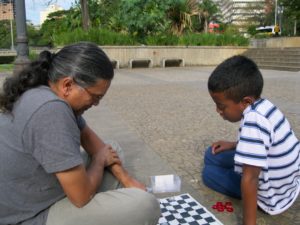You hear the passion in his voice, see it in his face.
That passion rises anytime The Rev. Stephen Dass speaks about “our kids” – the children of the streets of São Paulo, Brazil. The children who have left instability, rejection and worse for the relative security of the streets. The children loved by God, who is already at work to draw them close.
That last statement encompasses the heart of the São Paulo Mercy Ministry, headed by Dass and his wife, Mary, who have represented the Diocese of Central Florida here since 2013. His blog at spmercyministry.com shares stories of God’s active presence here in the largest city in the Western Hemisphere.
The Dasses’ love for street ministry brought the couple back to the city where they met as short-term missionaries in the 1990s. They served street children then and now, but their current ministry has a different focus. Back then, Rev. Stephen said, they thought they were bringing Jesus to the city.
“It’s been a long time and we’ve grown spiritually; we’ve grown in our understanding of scripture,” he explained. “And so we decided to go back and try to help the kids understand and recognize the presence of God in their midst, no matter what their situation.”
Another aspect of their present work is its long-term focus, Rev. Stephen said. He added that at they considered returning to Brazil after serving at St. Anne’s, Crystal River, they told The Rt. Rev. Gregory O. Brewer, diocesan bishop, that their missionary work wouldn’t have a time limit.
That long-term mindset has made a big difference, Rev. Stephen said. He and Mary see it in lives like that of then 13-year-old Erica, whom they met soon after their return to Brazil. Over their several encounters, including one after she was arrested, “She was a very proud young girl,” he said. “And very closed. … she was not a friendly girl.”
Several years went by, and they saw Erica periodically. Sometimes she ignored them, sometimes not, but she always remembered them visiting her in jail.
About two years ago, the couple saw her again for the first time in a while. A close friend she was with shared openly; Erica spoke more than in the past but still didn’t open up.
But recently, they had another encounter with her. This time, Erica sat and colored with them (one of their ways of drawing children in). “She told us that for her whole life, she’s just been rejected by her mother, who was a crack addict. … she always had to be on her own,” Rev. Stephen explained. “And she said that the only time she had any kind of bonding with her mother was when she used crack with her.”
Erica told them much more as the Dasses sat, amazed that this formerly closed young woman would be so honest. “I would have never thought that we would come to the point where this girl would become someone very dear to us,” Rev. Stephen said. “But it took us about a good eight years to come to this point. … She is who she is because she survived that way. … But I think right now, she just realized that she doesn’t have to be that kind of person with us. She’s free to be who she is.”
Their long-term perspective has allowed the couple to shift their picture of ministry into what Rev. Stephen called “a church without walls.”
“That’s what churches do,” he said. “In churches, the priest is not trying to make people become changed, to change their lives. The priest is there to love people, the people that come to the church, to help them in their journey, to help them understand it, and that was what we discovered.
“The way we looked at the kids [when we worked in Brazil earlier] had been an obstacle in getting to know [them] better … We realize now that in order for them to come to the point where they can be completely honest, it takes a long time.”
As they continue their ministry in the face of rising poverty, rampant government corruption and the continuing pandemic, the Dasses remain grateful for those who have not forgotten them in prayer and giving. They ask for prayers for wisdom, for provision and for Brazil’s burgeoning hunger problem that has sent more children to the streets.
As they look to the future, the Dasses also have a different definition of ministry success than they did in the past – different than many of their North American supporters may envision. Westerners, Rev. Stephen said, typically think of success in financial terms, but that is not only unlikely but does not constitute true kingdom success.
“Our purpose is to say the gospel is gospel,” he explained. “It’s gospel whether you are homeless; it’s gospel whether you live in a mansion. … It’s still good news no matter what. I think our success stories should be that children, without any understanding of God’s love or God’s direction, learn that and live that in their lives.”
Learn more about the Dasses’ ministry at spmercyministry.com. To give, please visit this link and select “Sao Paulo Mercy Ministry” from the dropdown.



